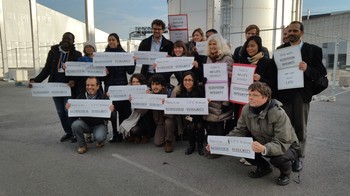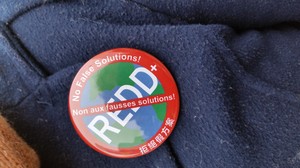COP 21 reflection from Carol Somplatsky-Jarman

Reflection from Carol Somplatsky-Jarman, an observer with the PC(USA)
As I entered the Pompidou Center a recent day, I encountered a group demonstrating in an effort to communicate to key players involved in the current climate negotiations.
Many people had passed that morning, including ministers, negotiators, and others, among the latter was former Vice President, Al Gore.
The group was lined up for a picture, with each person holding a sign, “There is no 1.5 C without eco-system integrity,” addressing their concerns about the implentation of REDD.
REDD is Reducing Emissions from Deforestation and Degradation of Forests, and is designed to protect forests, and to provide for indigenous people who inhabit them.
On the other hand, the folks assembled represented the REDD+ Safeguards Working Group, which is a coalition of more than 40 Southern and Northern environmental NGOs, civil society groups, and organizations representing local and indigenous peoples groups, all advocating for a more wholistic understanding of REDD and it’s implementation. This expanded understanding includes human rights, the rights of indegenous peoples, food security, and ecosystem integrity. Among the coalition’s groups are Greenpeace, Friends of the Earth (of many countries, from Switzerland, to Norway, to Cameroon), the Federation of Community Foresters, the Nepal Federation of Indigenous Nationalities (NEVIN), the Asia Indigenous Women’s Network, Centro Mexicano de Derecho Ambiental (CEMDA), and many others.
They believe that while “healthy ecosystems sequester and store carbon,” thus helping to counter climate effects such as flood and drought, ecosystems that are degraded or destroyed cannot accomplish this and can even become a source of damaging emissions.
Among other elements of their program, they oppose the conversion of virgin/natural forests to plantations.
An example of forestation the group feels should not be repeated is one in India where 3,500 acres were planted with exotic eucalyptus. There was little consultation with local stakeholders, and the project resulted in reduced groundwater and nutrients in the soil, elements which were critical for local food security. The financial risk shifted to local farmers who were then unable to repay their loans.
On the other hand, in the Sarangani Province, Philippines, “over five million trees were planted with and for the indigenous tribes of Mindanao.” Local people were involved early in the process, and the security of their land tenure rights was guaranteed. The project increased watershed resilience and enhanced local species habitat which resulted in improved livelihood opportunities, income and resilience of the local tribes.
According to Friedrich Wulf, Head of International Policy, Pronatura-Friends of the Earth, Switzerland: “Restricting an acceptable level of global warming of 1.5° C (or even 2° C) will not be possible if we do not adhere to the principle of ecosystem integrity. In other words, we need to phase out fossil fuels and in addition ensure that forests and peatlands are left intact, and mitigation measures on agricultural land do not jeopardize food security, human rights and biodiversity.”
The group is lobbying to have the treaty mention “ecosystem integrity,” and to have this mentioned in the implementation documents as well.

Link to a NY Times article on the Climate Deal and Forests.